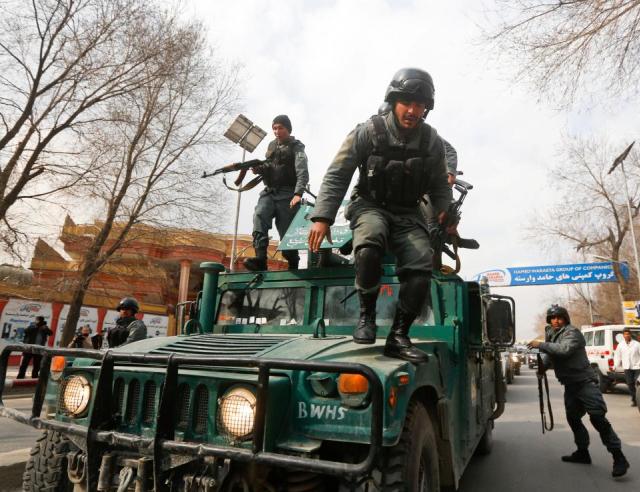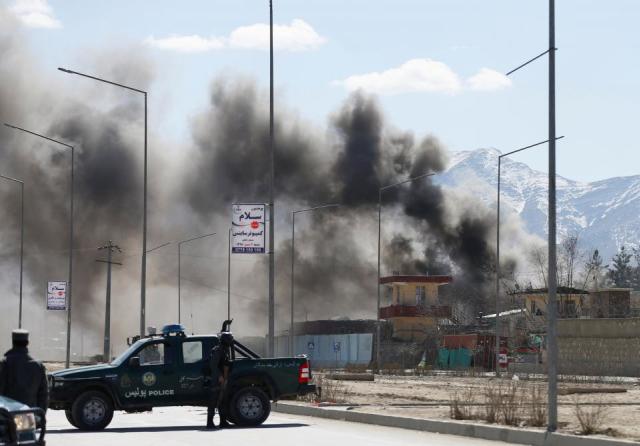Of all the countries the Islamic
State militant group (ISIS) has tried to conquer, Afghanistan has
proved the toughest. The country’s resilience is particularly impressive
given ISIS’ continued terrorist attacks, designed to instil fear across
its provinces.
On March 5, the group released an execution video
from its stronghold in Achin, a district of Nangarhar province on the
border with Pakistan. In the film, two men kneel before the militants,
who accuse them of working as government spies. One is shot in the head,
the other is decapitated. Three days after the video came out, a bomb
went off at the rear of a military hospital in the Afghan capital of Kabul.
Gunmen dressed as medics then entered the building and opened fire,
leading to an hours-long battle with security forces. The final death
toll was 38 people, with dozens more injured. ISIS’ Amaq news agency
wasted no time in taking credit.
Taken together and in isolation, these two events seem to suggest that ISIS is thriving in Afghanistan, just as it once did in Libya, Iraq and Syria.
One could make the assumption that in Afghanistan, the group is
maintaining its perverse version of law and order throughout its
territory, while still having the organization and resources to strike
the capital. It’s what ISIS would like you to think—but it may not be
true.
ISIS’ position in Afghanistan is
getting weaker by the day. U.S. forces have promised to defeat the
group by the end of the year, while NATO and Afghan troops have already
cut the number of districts the group holds from more than 10 to between
three and five.
It is a humiliating loss for ISIS, which has
failed to make any significant headway in Afghanistan, a country that
the Afghanistan Analysts’ Network describes as having “historical cache
as the home of the first successful jihad of modern times.” Split into
398 districts, only a tiny part of Afghanistan ever belonged to ISIS.
Now, less than two and a half years after the group’s commanders (a
bunch of former Pakistan Taliban members) pledged allegiance to ISIS,
the group looks to be in the sunset of a fairly dismal attempt to raise
its black flag over Afghanistan.
Back in
October 2014, when the group’s leaders made their oath, they might have
thought that they could replicate ISIS’ successes elsewhere in the
Middle East and North Africa. But, Afghanistan already had a dominant
terrorist group—and it certainly wasn’t going to move over for some
jumped-up jihadists.

The Taliban currently controls more territory in Afghanistan than at any time since the 2001 U.S.-led invasion. Last month, the Long War Journal estimated the group held 43 of the country’s districts and was influencing or contesting 56 more. Several of the experts Newsweek
spoke to said they believe rogue elements of the Taliban were behind
the Kabul hospital attack but ISIS, greedy for publicity, was permitted
to take credit.
Usually, the Taliban is not so lenient. “The
Taliban sees ISIS as a competitor on the battlefield,” says the
Afghanistan Analysts’ Network, whose members asked to be quoted only
with the organization’s name. “When ISIS began appearing in Afghanistan
and tried to get a foothold, the Taliban cracked down on them.”When ISIS tried to gain traction in the west of the country, adds Ronald Neumann, the former U.S. ambassador to Afghanistan and now president of the American Academy of Diplomacy, the Taliban “sent in reinforcements and badly damaged ISIS there.”
Part of
the Taliban’s dislike of ISIS in Afghanistan is that the group is made
up of former Taliban members, some of whom the Taliban expelled for
being too brutal. (Members of other central and south Asian militant
groups make up the rest of ISIS).

That the group contains these
extremists also explains its failure to gain a foothold in Afghanistan.
It’s very hard to win hearts and minds, when, as ISIS did in August
2015, you force a group of 10 Afghans to kneel on explosives and blow them up.
“The Taliban is brutal but it usually does not overreach altogether in
its brutality,” says Vanda Felbab-Brown, senior fellow at the U.S.
think-tank, the Brookings Institution. “ISIS in Afghanistan has applied
the opposite tactics. It revels in brutality, brutality that is extreme
even by Afghan standards.”
Unlike the Taliban, says Hameed Hakimi, a
research associate at the U.K. think-tank, Chatham House, ISIS does not
make any concessions to local people. “The group is completely anti
local culture,” Hakimi says. “It ignores issues of honor, belief in
clans and ruler networks, hierarchies of society. For ISIS, framing a
caliphate goes against all of this. It see itself as a purification.”Large swathes of the Afghan population might loathe the Taliban, but it has still managed to maintain considerable local support, particularly in rural areas. Felbab-Brown points to the militants allowing the opium trade to continue versus ISIS prohibiting it. ISIS is not just killing Afghans, it’s costing them jobs, she says. It’s hardly surprising some see the Taliban as the lesser of two evils.
The hostility ISIS faces internally, from Afghans and the Taliban, has kept it small, and made it easier for government forces and international allies to target it. “Afghan national forces, the U.S., NATO and the Taliban are pounding away at ISIS,” says Felbab-Brown, who also references NATO’s belief that Russia is assisting the Taliban in Afghanistan.
Largely
friendless in the country, ISIS seems unlikely to stage a resurgence.
Geographically distant from central command in Iraq and Syria, it can
count on little support, particularly in terms of manpower, from the
parent organization. Besieged on all sides, the U.S.’ promise to defeat
the group could still come true.
Comments
Post a Comment